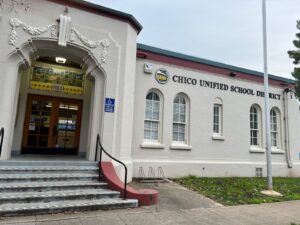by Natalie Hanson
posted May 31
A Chico mother has appealed her case against Chico Unified School District (CUSD), accusing it of inappropriate conduct and secrecy in a gender identity case.

Aurora Regino has argued that the district must out students who are trans or exploring their gender identity to their parents and that a federal judge denied her right as a parent to control the upbringing of her child. But a panel of Ninth Circuit Court of Appeals judges questioned whether Regino changed her case substantially – enough to send it back to the federal judge for reconsideration.
Center for American Liberty attorney Josh Dixon told the panel in the May 9 hearing that Regino wants parents to have “broad authority,” and claimed that the district’s policy is about “parental secrecy.”
Regino can appeal the previous ruling without revising her case, but at the May 9 hearing, the panel questioned whether she had an argument that would justify reconsideration.
CUSD argued in court May 9 that it follows state law in protecting the confidentiality of students seeking counseling, and that Regino’s argument’s focus seems to have “significantly narrowed.” The district said the oral argument was the first time the appellant narrowed the case to focus on the school’s accommodating of a student by using new pronouns.

Senior U.S. District Judge John Mendez -– who was appointed to the bench by former President George Bush — tossed Regino’s case last July, ruling that Chico Unified successfully identified legitimate government purposes for its nondisclosure policy protecting the rights of LGBTQ students to privacy, freedom from discrimination, and health and safety as guaranteed by federal and state statutes and Constitutional provisions. Students have a legally-protected privacy interest under the California Constitution with respect to information about their gender identity, Mendez said.
Justices Kim McLane Wardlaw, Morgan Christen and Mark Bennett presided this time over the case, which was first filed in January 2023 in federal court in the Eastern District of California. Regino alleges that a school counselor at Sierra View Elementary coaxed a student into adopting a male identity after the fifth-grader confided that they “felt like a boy.” She claims her child was encouraged to “socially transition” by adopting a new name and male pronouns, and that the school did not inform her.
Ahead of the appeal hearing May 9, multiple educators, experts and educational organizations filed to support Chico Unified in the appeal. Attorneys general from different states also filed, saying states have a compelling interest in ensuring a safe and supportive school environment.
California’s Department of Education (CDE) also said in a January filing that state law emphasizes the rights of LGBTQ students and requires the department and the state superintendent of public instruction to take action in supporting them.
Dixon told the panel May 9 that the state does not have the right to change school environments to support a student’s identity.
“Children are immature and make rash decisions and parents are assumed to be fit and act in their children’s best interests,” Dixon said. “The complaint plausibly alleges that social transitioning cuts deep into the fabric of the family driving a wedge between parents and children when children need it most.”
Dixon said his client’s position is not that the parent has to know if a child wants to change the name they are referred to by at school. He said the problem is when the school proactively creates an environment that “affirms” a child’s chosen pronouns.
“It is when the school goes further and creates the affirming environment for the child that the constitution is offended,” he said.
“There is no reasonable expectation of privacy that a child has in things that go on within the school, against their parents,” Dixon said. “The consequences of that would be horrific on the relationship between the parent and the child. Parents need to know what happens at school to direct their child.”
The district said in court filings that there are circumstances where disclosure to parents of what students tell counselors can lead to harm to students -– and the district has a legitimate state interest in protecting student privacy and creating a “zone of protection” from potential domestic violence.
One in 10 transgender individuals experience overt violence from a household member, and 15% are forced to leave their homes because of their identity, note earlier filings in the case.
CUSD attorney Jimmie Johnson told the panel that Regino’s claim that social transitioning is an “external treatment” was proven false in other lawsuits.
“Simply being transgender is not itself an ailment,” Johnson said. “And it’s not something the district is doing to the transgender person. What the district is doing is called accommodation.”
Johnson said a parent doesn’t have a “right to notification” about what a child tells a school counselor beyond what is established in state and federal law.
State officials also testified at the panel that the state does not consider pronoun choice a form of medical treatment.
The panel did not indicate when it may rule. It could affirm the federal judge’s decision, or order that the judge’s ruling was in error and remand the case for further consideration.
The lawsuit was the third in California filed by the right-wing Center for American Liberty which is headed by Harmeet Dhillon, formerly an adviser to President Donald Trump.
Natalie Hanson is a contributing editor to ChicoSol.

Very informative regarding the details and arguments of the case. Thanks Natalie, for the great work you do with ChicoSol!
I have seen quotes from leaders of the “parent’s rights” movement to the effect that they would rather their child be dead than trans – which I interpret as a parent who might well murder a trans child. And I came of age in an era when there were fathers who killed their sons for having long hair – nothing to do with gender identity, just a fashion for long hair. Children who are harmed are usually not harmed by strangers, but by someone close to them. Their parent’s are not necessarily a source of safety.